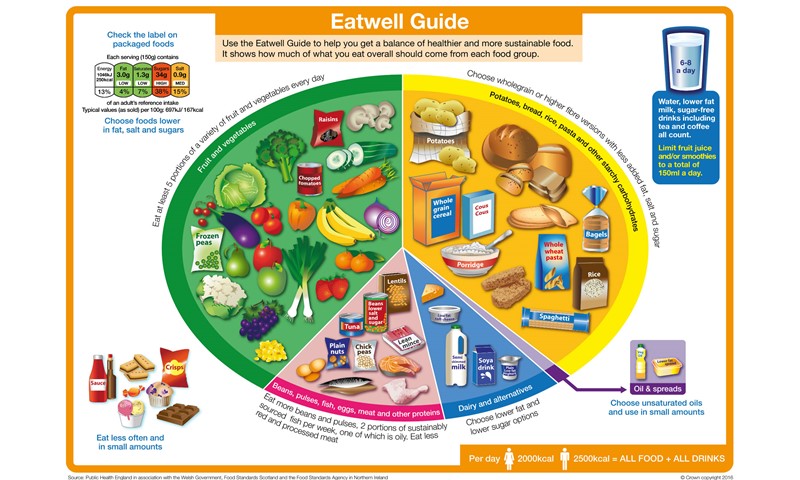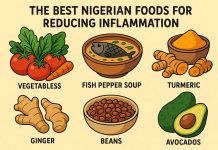The link between diet and heart health is well established, yet only about 35% of Nigerians consume enough fruits and vegetables regularly. You’ve probably thought about improving your diet, but without a plan, good intentions often fail—because “he who fails to plan plans to fail.” This article will help you create a heart-healthy diet in a Nigerian context.

Choosing Heart-Healthy Foods
Fruits and Vegetables
Fruits and vegetables provide antioxidants, vitamins, and minerals that help protect heart arteries from damage. Aim for five servings daily, either alongside meals or as snacks. A serving equals one medium fruit like a banana, apple, or orange. For smaller foods, a handful—whether almonds, agbalumo (African star apple), or grapes—counts as one serving.
Vegetables are more accessible than you think, so don’t despair. Peppers (chili, bell), tomatoes, onions, okra, carrots, and leafy greens like those used in èfó, cabbage, and lettuce are all excellent choices. Green leafy vegetables contain nitrates that help regulate blood pressure, while brightly colored vegetables like carrots and peppers are rich in carotenes and vitamin C, which maintain blood vessel health.
Nigeria’s Ministry of Health recommends eating fruits or vegetables with every meal. This becomes easy if your main meals include soups or sauces packed with vegetables. Add fruit or raw vegetables as snacks throughout the day.
Whole Grains
Whole grains are minimally processed and retain their nutrient- and fiber-rich coverings. Local options include Ofada rice, corn, sorghum, and wheat. Their fiber binds to cholesterol, helping to regulate its levels.
Reduce refined grains like white rice, white bread, conventional pap, and semovita. Instead, choose Ofada rice, whole-grain bread, less-refined pap, and wheat-based swallow.
Lean Protein
Plant-based proteins such as walnuts, cashew nuts, beans, groundnuts, soybeans, and peas, as well as lean meats like fish and chicken, provide essential protein, fiber, and healthy fats. They should replace red and processed meats like sausages, which are linked to high blood pressure and certain cancers.
Healthy Fats
Heart-friendly fats come from olive oil, canola oil, coconut oil, groundnut oil, fatty fish, and nuts. These provide monounsaturated and polyunsaturated fats, including omega-3 fatty acids, which support heart health and help manage cholesterol levels.
Choose oils that remain liquid at room temperature, as they are rich in healthy fats. Reduce saturated fats, especially trans-fat-containing products like some margarines. Coconut and palm oil contain mixed fats and should be used in moderation.

Eatwell: A guide for a healthy balanced diet. From NHS Inform
Creating a Balanced Meal Plan
Here’s an example of a one-week heart-healthy meal plan:
| Meal | Option 1 | Option 2 |
|---|---|---|
| Breakfast | Oats with groundnuts and banana slices | A cup of unsweetened pap with moi moi |
| Mid-Morning Snack | A corn cob (boiled or roasted) | A handful of almonds or agbalumo |
| Lunch | Ofada rice with tomato stew and grilled fish | Efo riro (spinach soup) with wheat swallow |
| Afternoon Snack | A medium-sized orange or pawpaw slices | A medium-sized apple or watermelon slices |
| Dinner | Beans porridge with boiled plantain and a side of cabbage salad or èfó rírò | Grilled chicken with steamed vegetables and whole-grain bread |
| Before Bed (if hungry) | A handful of walnuts or a cup of unsweetened yogurt | A handful of groundnuts or a cup of low-fat milk |
Simple Meal Planning Tips
- Cook in batches and store meals.
- Use less salt; try herbs and spices.
- Grill, steam or boil instead of frying.
- Drink water instead of sugary drinks.
- Eat smaller portions more frequently.
Conclusion
A heart-healthy diet reduces the risk of heart disease, improves overall well-being, and keeps your body energized. Small, consistent choices—like swapping refined grains for whole grains, eating more vegetables, and choosing healthy fats—make a big difference. Start today, and make healthy eating a lifelong habit!
Learn more about the best foods for your heart here.









